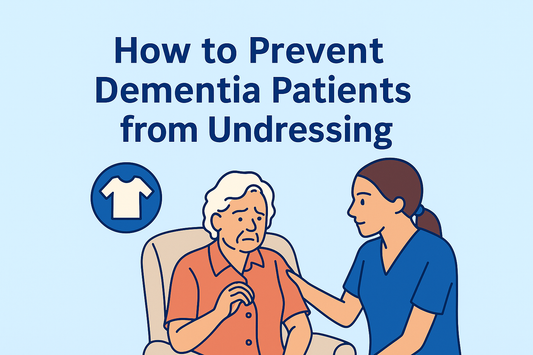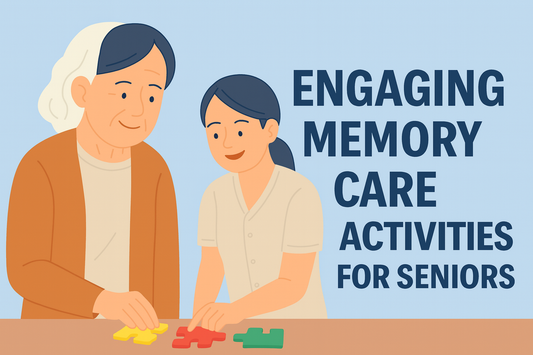
10 Ways to Manage Wandering in Dementia Patients
WHAT IS 'WANDERING'?
As a caregiver, you will face a numerous challenges with the progress of dementia in your loved one. One of them is the habit of wandering. What this means is that as a person’s dementia progresses, they slowly lose the familiarity they have with their surroundings and become unable to recognize people. As such, you can have situations where a loved one may decide to go for a walk alone, but not be able to find their way back. To put it simply, they get lost, even in a setting that is supposed to be familiar to them.
QUICK LINKS - TOPICS COVERED:
- WHAT IS 'WANDERING'?
- #1 - DO NOT CORRECT YOUR LOVED ONE
- #2 - KEEP A STEADY ROUTINE
- #3 - UNDERSTAND WHEN IS IT MORE LIKELY TO OCCUR AND WHY
- #4 - MAKE SURE YOUR LOVED ONE’S NEED ARE TAKEN CARE OF
- #5 - PREPARE THE HOUSE
- #6 - IF WANDERING AT NIGHT STARTS TO OCCUR
- #7 – IDENTIFICATION
- #8 - REMOVE ANY KEYS FROM YOUR LOVED ONE’S REACH
- #9 - SUPERVISION
- #10 - AVOID BUSY AND CROWDED PLACES
- OTHER IDEAS FOR MANAGING "WANDRING”
- USING MEDICATION TO MANAGE THE WANDERING
- KEEPING A LOVED ONE THAT WANDERS SAFE:
It is a fact that six out of ten dementia patients may start wandering at any stage of the disease. This is normal though, given the fact that diseases like Alzheimer’s interfere with a person’s memory.
Here are some signs of wandering that a person might be able to notice at the beginning:
- Your loved one may be spending more time to get home from a familiar place
- Your loved one may seem disorientated even when at home or work
- Your loved one may want to go home, even when at home, or to work even when at work
- Your loved one does not remember where the bathroom, bedroom or dining room is anymore
- Your loved one may seem busy doing a chore or any activity, without actually doing anything
The list above is just an example. There may be other similar signs according to your loved one’s personality and daily routine. It is important that you try to be as alert as possible.
As worrying as it may seem to think of your dementia suffering loved one feeling lost, there are some things that you can do in order to better manage wandering and to make sure they and others are safe. Below is a list of 10 examples of what you may do in order to help yourself and your loved one.
#1 - DO NOT CORRECT YOUR LOVED ONE
There may come a time when your loved one will think they need to go home, even if they are at home, for example. Keep in mind that they feel lost and correcting them will only increase their anxiety level. Instead, try to reassure them by telling them that the place they are in at the moment is safe and that they have your company and help with anything they may need. Thus, their anxiety levels can be decreased and they will feel more relaxed, even if they still may not recognize the place they are in.
#2 - KEEP A STEADY ROUTINE
Having a steady daily plan is very important given that there is always a chance of your loved one getting lost or disoriented. Try to keep all the activities and daily chores as similar as possible from one day to another. The same goes with any activities, such as hobbies. Be sure to do everything more or less at the same hour, and in the same order. Remember: creating a routine and sticking to it will not only prevent wandering, but also reduce the dementia patient’s anxiety level. This will keep them safe overall.
#3 - UNDERSTAND WHEN IS IT MORE LIKELY TO OCCUR AND WHY
Wandering can occur at any given time or moment of the day—early in the morning, after lunch, during the middle of the day, after dinner, at bedtime or even during the middle of the night.It could be a simple coincidence, but there is a chance that something is triggering this behavior. It could be anything, from the food to the place they are seated in or a bedroom they do not recognize.
Identify possible triggers by taking a closer look at whether there are, or were, any changes made in the house since the symptoms first began to show. As caregiver, you will need to understand that the disease affects most recent memories and sometimes these changes may be the cause of your loved one’s confusion.
Once you have identified the possible cause, try to prevent it by understanding what changes were made or will have to be made in order to keep your loved one calmer.
#4 - MAKE SURE YOUR LOVED ONE’S NEED ARE TAKEN CARE OF
Often things as simple as hunger, thirst, or the need to use the bathroom may cause a dementia patient distress. Consequently, this state of mind can make them start to wander. But as they will not remember nor know how to adequately take care of themselves, they may start wandering and putting themselves and others in danger.
To avoid such instances, always make sure that your loved one is well fed, hydrated, and other personal care needs are taken care of. Keep them feeling as comfortable as possible.
#5 - PREPARE THE HOUSE
If your loved one has started to wonder occasionally, it is highly likely that the situation will become recurring. Therefore, it is very important to prepare their living environment so that your loved one cannot get out without supervision. For example, you can try camouflaging the doors and door knobs by painting them the same color. You can use curtains of the same color as the walls, in order to avoid their realizing the presence of a window.
You can also place silent alarms or other alerting devices that can inform you when a door or window is being opened without supervision. The extent of the kind of system to use is entirely up to the primary caregiver of the dementia patient. But it is must be done.
Other things that you can do include placing locks in places your loved one will not be able to see them or reach them. For example, at the top of doors, you could install a slide lock mechanism as opposed to a normal doorknob lock. Although you may not feel the necessity in the initial stages, it will eventually be needed to keep your loved one safe and away from harm.
#6 - IF WANDERING AT NIGHT STARTS TO OCCUR
Sometimes, a dementia patient may wander off during the middle of the night. This can happen if they wake up during the night. In such instances, you can install motion sensor activated lights in their room. The last thing you would want to happen is for your loved one to fall and hurt thir selves because of the darkness.
Next, try and understand if they started wandering because of hunger or their need to go to the bathroom. Whichever the case, you should restrain liquid ingestion about two hours before bedtime, to ensure that they will not need to use the bathroom during the night. At the same time, make sure that your loved one uses the bathroom and take care of their personal care needs before going to sleep. This can be done through a consistent bedtime routine that ensures ideal consditions for sleeping at night.
#7 – IDENTIFICATION
Sometimes, despite your efforts and best intentions, your loved one may still end up outside of the house. This can pose a serious problem. To avoid any incidedents as well as unfortunate occurrences, you can make sure that your loved one carries an identification plaque or a piece of jewelry with their name on it and your contact and address. You may also place an identification tag on their clothes. There are many such items available today for such purposes. This way, you make sure that in case your loved one runs into somebody while wandering, they can call you or bring your loved one back home safely.
#8 - REMOVE ANY KEYS FROM YOUR LOVED ONE’S REACH
As mentioned above, sometimes, despite doing the best you can and putting in all the effort to protect your loved one from wandering, they may still end up outside and lost. It can happen due to something very simple and may have gone over our minds. For example, leaving house keys or car keys within reach of your loved one is very dangrous as they can easily escape your notice when they leave the house. To avoid this, make sure that your loved one cannot get out of the house unless you or another caregiver knows about it. Also, make sure that they can’t drive. To put it simply, it is best to remove or relocate any keys, whether house or car keys, to a place that is away from the reach of your loved one.
#9 - SUPERVISION
Regardless of the situation, make sure you never lose sight of your loved one. You should never leave a dementia patient alone at home or even in the car. When that happens, the probability of something unfortunate happening escalates and causes concern for many parties. Make sure that you are always there and if you can’t, there is someone responsible substituting you.
#10 - AVOID BUSY AND CROWDED PLACES
This tip is valid from the beginning of the disease until the very end. Inserting your loved one in crowded and busy places will only increase their levels of anxiety and make them want to go away, which results in a lot of wandering. It may be best to avoid such places to make sure your loved one doesn’t get disoriented.
OTHER IDEAS FOR MANAGING "WANDRING”
Here are some more ideas to manage your loved one’s habit of wandering.
- Inform your neighbors about your loved one’s situation and ask them to call you if they see your loved one alone or wandering
- Keep a recent photo or video in order to more easily find your loved one in case they disappear and get lost
- In case your loved one is missing, call 911 and inform them about the situation and your loved one’s condition.
USING MEDICATION TO MANAGE THE WANDERING
While there are a number of medications that a doctor can prescribe for a dementia patient. However, there is no specific medication to prevent or stop the wandering. Nevertheless, you should talk with your loved one’s doctor about it as soon as it occurs. For example, revising your loved one’s medication can be advisable since you are dealing with a new occurrence.Medication that keeps your loved one calm, less anxious and may make them sleep better.
KEEPING A LOVED ONE THAT WANDERS SAFE:
As soon as you notice that your loved one is starting to wander, you should put the tips above in practice.In addition, you should join and acquire MedicAlert® + Alzheimer's Association Safe Return®. It is a service that provides an ID collar or bracelet to be worn by your loved one. The piece of jewellery has a nationwide phone number and enables you to find your loved one wherever they may have gone.
Learn more about it at http://www.alz.org/care/dementia-medic-alert-safe-return.asp



